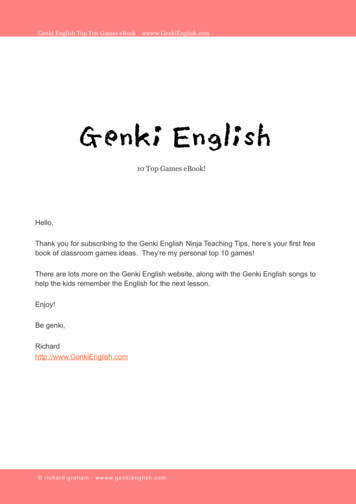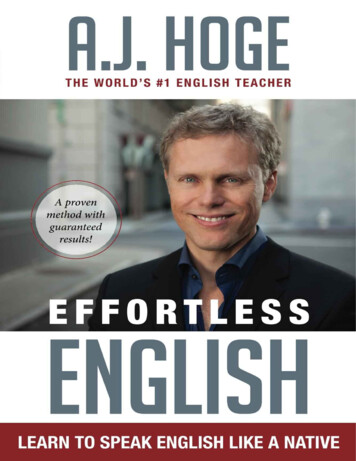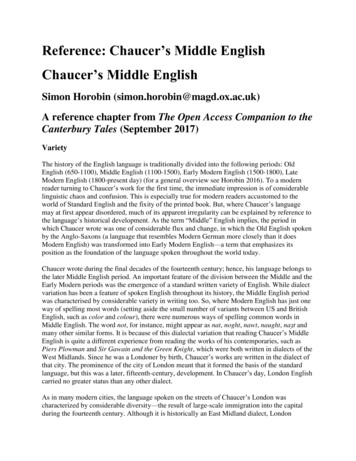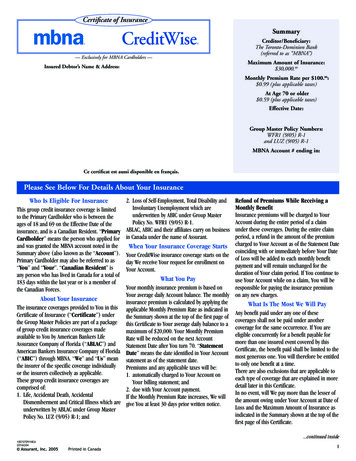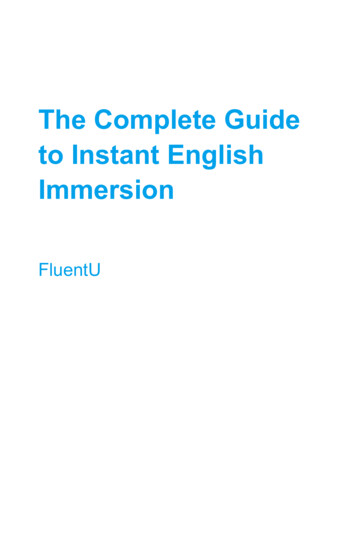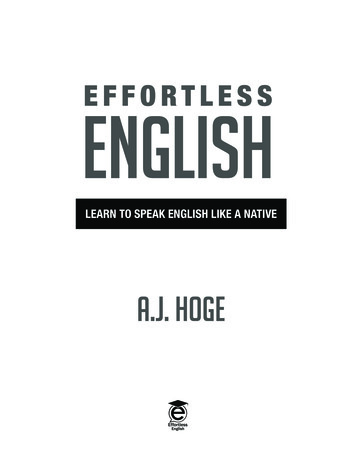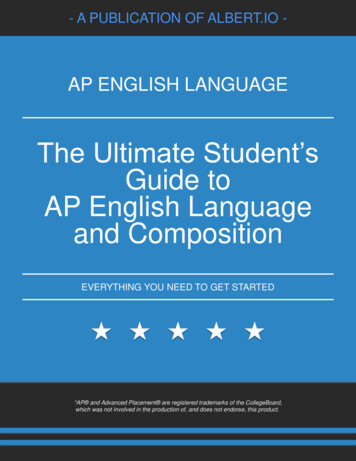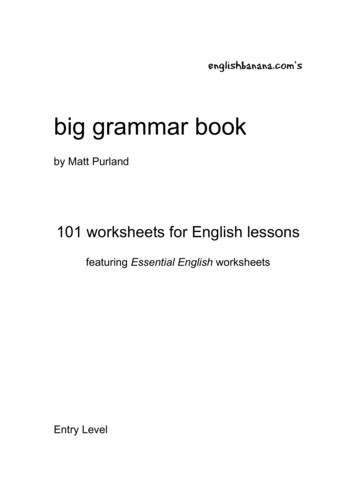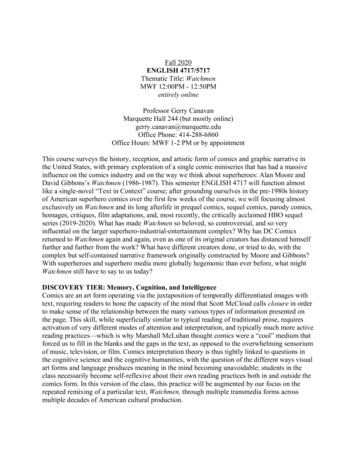
Transcription
Fall 2020ENGLISH 4717/5717Thematic Title: WatchmenMWF 12:00PM - 12:50PMentirely onlineProfessor Gerry CanavanMarquette Hall 244 (but mostly online)gerry.canavan@marquette.eduOffice Phone: 414-288-6860Office Hours: MWF 1-2 PM or by appointmentThis course surveys the history, reception, and artistic form of comics and graphic narrative inthe United States, with primary exploration of a single comic miniseries that has had a massiveinfluence on the comics industry and on the way we think about superheroes: Alan Moore andDavid Gibbons’s Watchmen (1986-1987). This semester ENGLISH 4717 will function almostlike a single-novel “Text in Context” course; after grounding ourselves in the pre-1980s historyof American superhero comics over the first few weeks of the course, we will focusing almostexclusively on Watchmen and its long afterlife in prequel comics, sequel comics, parody comics,homages, critiques, film adaptations, and, most recently, the critically acclaimed HBO sequelseries (2019-2020). What has made Watchmen so beloved, so controversial, and so veryinfluential on the larger superhero-industrial-entertainment complex? Why has DC Comicsreturned to Watchmen again and again, even as one of its original creators has distanced himselffurther and further from the work? What have different creators done, or tried to do, with thecomplex but self-contained narrative framework originally constructed by Moore and Gibbons?With superheroes and superhero media more globally hegemonic than ever before, what mightWatchmen still have to say to us today?DISCOVERY TIER: Memory, Cognition, and IntelligenceComics are an art form operating via the juxtaposition of temporally differentiated images withtext, requiring readers to hone the capacity of the mind that Scott McCloud calls closure in orderto make sense of the relationship between the many various types of information presented onthe page. This skill, while superficially similar to typical reading of traditional prose, requiresactivation of very different modes of attention and interpretation, and typically much more activereading practices—which is why Marshall McLuhan thought comics were a “cool” medium thatforced us to fill in the blanks and the gaps in the text, as opposed to the overwhelming sensoriumof music, television, or film. Comics interpretation theory is thus tightly linked to questions inthe cognitive science and the cognitive humanities, with the question of the different ways visualart forms and language produces meaning in the mind becoming unavoidable; students in theclass necessarily become self-reflexive about their own reading practices both in and outside thecomics form. In this version of the class, this practice will be augmented by our focus on therepeated remixing of a particular text, Watchmen, through multiple transmedia forms acrossmultiple decades of American cultural production.
2LEARNING GOALSUpon completion of this course, students will be able to: Identify and understand various formal characteristics of comic art; Apply techniques of literary analysis to comics and graphic novels; Demonstrate understanding of the cultural and historical contexts in which variouscomics and graphic novels have been written; Explores the ways that comics require a different mode of cognition and a different sortof dedicated, active attention than either literature or film; Use literary study to develop skills for careful reading and clear writing; Read and discuss comics on the levels of both form and content.REQUIRED TEXTS (available at the Book Marq on 16th Street or via ComiXology online)Alan Moore and Dave Gibbons, WatchmenKieron Gillen and Caspar Wijngaard, Peter Cannon: ThunderboltGrant Morrison and Frank Quitely, All-Star SupermanNatacha Bustos, Amy Reeder, and Brandon Montclare, Moon Girl and Devil Dinosaur: TheBeginningDarwyn Cooke and Amanda Conner, Before Watchmen: Minutemen and Silk SpectreJ. Michael Straczynski and Adam Hughes, Before Watchmen: Dr. ManhattanGeoff Johns and Gary Frank, Doomsday ClockTom King and Jorge Fornés, Rorschach #1Any edition of these texts is suitable, including a digital version. Selected additional texts will bemade available through D2L, as well as during class.We will also discuss the Zack-Snyder-directed film adaptation of Watchmen from 2009, as wellas the HBO sequel series Watchmen from 2019-2020. Students will be responsible for viewingthese materials; the cheapest legal way will likely be a trial membership of HBO Max, whichoffers a seven-day free trial. Please let me know if this is proving to be a challenge to you. I amalso exploring options for a socially distanced screening of these materials on campus during thesemester, but the complexities and disruptions of the pandemic may unfortunately make thisimpossible.FORMATLike many classes at Marquette this semester, the originally planned format for this course hasbeen disrupted by the COVID-19 pandemic. The course has been reconceived and rebuilt tomake sense in an entirely online format, facilitated by asynchronous work on Marquette’s D2Llearning platform and by synchronous meetings on the free video-conferencing platform Zoom.On Mondays and Wednesdays, we will meet together on Zoom. If possible, we will have fullclass meetings on these days; if that proves unwieldy, we will switch to a “flex” model in whichhalf the class signs into the Zoom conference and the other half watches the recorded discussionafterwards. Attendance will not be required on these days; if you are unable to make thesynchronous meeting, you can watch the recorded session and make a D2L response afterwardsto receive full credit for attendance.
3By Friday, I will ask you to post a freeform response in the designated “sandbox” forumfor that week. This does not have to be a formal written post, but can also take the form of apodcast, short video, a work of art or music, a short story or fan fiction, a comic, or more; anyresponse of any sort is fine, provided it is thoughtful and substantial. By the end of the weekend,I will ask you to respond to at least two other sandbox posts. The idea is to respond collectivelyto the material we are studying together in a way that is not stifling, anxious, or overstructuredby academic expectations that cannot really apply to this odd and altered educational context; myhope is to strip away grading strictures that can only be dysfunctional in the current moment andfoster instead more multifaceted, more generous, and hopefully richer intellectual encounters,driven by your interests.These sandbox posts will replace much of the written assignments in the course. The remainingassignments will be mini-papers that test some of our powers of analysis in a low-stakesexperiential way, without rising to the level of a traditional academic paper, as well as a finalpaper or project that responds to Watchmen as a cultural object in a way that is important to you.SPECIAL CIRCUMSTANCES AND PERSONAL EMERGENCIESEveryone at Marquette recognizes that this is an extremely difficult time which may be filledwith different sorts of uncertainty as we move forward with the academic year. Your safety,health, and well-being are our primary concern and we want to be able to support you in any waythat we can.The university also understands that you may be facing personal obstacles that may make itdifficult to meet your typical academic goals. Please refer to the Student Resources page on theMarquette COVID-19 Response webpage for information and resources on basic needs such ashousing, food, financial aid, and medical and mental health; the webpage also offers informationon official University communications, access to technology, and student services. Faculty andstaff are also here for you.If you feel like your performance in the class is being impacted by your situation outside of class,please don't hesitate to talk with me. I want to be a resource for you. You are not alone.COURSE REQUIREMENTSClass Participation (Mon/Wed Zoom Lectures and make-up D2L Posts)Sandbox Posts (weekly Friday post and two weekly responses)Close Reading mini-paperThinkpiece mini-paperFinal Paper/Project20%20%20%20%20%Additional details on these assignments can be found as an appendix at the end of this document,as well as under CONTENT on D2L.Graduate students will be responsible for a separate set of assignments, which will be distributedseparately to them.
4GRADINGGrades will follow the following rubric:* To earn a C, you must clearly restate the meaning or project of a text in your own terms. A Cessay may volunteer an original argument, but will likely lack evidence or analysis of its sources.C essays are clearly written, though they might display some grammatical weakness.* To earn a B, you must begin to raise important questions about the text under consideration andto use those questions to drive your own interpretive agenda. A B essay typically advances anoriginal argument and provides solid analysis of the text(s) under consideration. B essays areclear, concise, and free of grammatical errors.* To earn an A, you must construct an essay that does more than simply comment on the work ofothers; you must forward, counter, or transform what they have to say. An A essay advances anoriginal argument that builds toward a climax and makes a persuasive case for its ownsignificance. A essays are clearly written, and often eloquent.* A D means that you have not written in clear prose or that you seem to have deeplymisunderstood the text. An F means that you did not fully or seriously engage the assignment.* A-, B , B-, C , and C- grades fall squarely in the gaps between the above categories.Grades are not awarded on an artificial curve or in competition with each other. There is noreason that every student cannot receive an A in this course.UNGRADED ASSIGNMENTSYour makeup posts and sandbox posts will be graded on an extra-credit / pass / low-pass / failbasis: Fulfilling all the requirements of the assignment will earn you full credit; Failing to do so will earn you half-credit (at best) or no credit (at worst); Going beyond the terms of the assignment in an especially ambitious or creative way can earnyou extra credit.QUIZZESI do not like to give reading quizzes; I think they infantilize the college-level scholar. However,this is by necessity a very reading-intensive class; if it seems to me that people are not keepingup with the reading, pop quizzes may become necessary despite my philosophical objections.You have been warned.FORMAT OF WRITTEN WORKYour final paper should be typed in twelve-point font, double-spaced with one-inch margins,saved in a format Microsoft Word can open. Your filename should contain your name in it, for
5example, yourlastname-closereading.docx. Get into the habit of giving your files descriptivenames of this sort.I expect you to edit and proofread all written work, even blog posts and blog comments. Draftsthat contain excessive typos or grammar mistakes may be returned to the author for correctionbefore I offer comments.Please give each piece of writing an original title, and include your name, assignment, and duedate in a header on the first page. Insert page numbers if your work spans more than one page.All sources relied upon for the writing of your paper, including the primary text, must beappropriately cited.PAPER SUBMISSIONThe papers should be submitted via D2L’s Dropbox by class time on the due date. Late paperswill be penalized a full grade for each day that it is late; due to university policy late finalpapers will not be accepted at all. However, see below about extensions.Work can be submitted early with no penalty. Please feel free to organize the timing ofassignments in this class in a way that works for you.EXTENSIONSAlthough the papers in this course have a sufficiently long timetable to allow you to plan andcomplete all assignments in a timely manner, I nonetheless recognize that each of you has aunique schedule and that some of the due dates I have selected could occasionally proveproblematic for individual students in the course, especially in the context of the pandemic. Ifyou find that you will need an extension on a particular assignment due to this kind ofconflict, please contact me to arrange an alternative due date. There is no need to concoct anelaborate story to justify this, or to lie to me; simply tell me the truth about what’s going on andwe can work out an alternative that works for you.TECHNOLOGY IS TERRIBLE: PLAN AHEAD!The Internet goes down. Files become corrupted. Computers crash. These are predictable facts oftwenty-first century life, not emergencies. For this course, for all your courses, for the rest ofyour career and your life in this world you need to develop work habits and strategies that takeinto account the basic, inescapable unreliability of computers. Start your assignments well inadvance of the due date; save them often; save backup copies of essential documents, includingcopies off-site using a service like Carbonite, Dropbox, or Google Drive.ATTENDANCE AND CLASS PARTICIPATIONClass discussion is an essential component of this seminar; class discussion, not lecture, will bethe primary means by which we will investigate these texts together. It is therefore crucial thatyou come to class every day having read the required material and prepared to discuss it, as wellas having viewed any prefatory textual or audiovisual material I have posted on D2L.
6As noted above, due to the circumstances of this semester I will not begin the semester requiringattendance in our Zoom meetings, provided you watch the recorded session and post on D2Lafterwards. However, this policy will be subject to review; the Zoom sessions require a criticalmass of students to be functional and if they become too empty I will need to start requiringattendance. This is a collective action problem and I trust that we will be able to figure it outtogether.The course adheres to Marquette University’s attendance policy, which can be found on theInternet at gulations/#attendance.You are allowed three absences (defined as neither attending the Zoom nor writing a D2L postbefore the next class period) over the course of the fall semester. After that, your classparticipation will drop by a letter grade for each additional unexcused absence. Upon theseventh unexcused absence, you will receive a WA (Withdrawn—Excessive Absences) for thesemester.As with a face-to-face class, each student is expected to participate in and contribute to ourdiscussions. Just being in the room is not enough. If there is a reason you feel you cannotparticipate in a given session, please let me know before class begins so I do not call on you thatday.D2L FORUMSThis course will make extensive use of the D2L forums at http://d2l.mu.edu. In addition to beinga place where you can find electronic copies of the syllabus and other course handouts, D2L alsofeatures an online forum where you can express your response to the material before class beginsand where we can continue our discussions after class is over.The D2L discussion forums are an excellent place for people who may feel inhibited by in-classdiscussion to share their opinions with the class. I will be reading the discussion forum regularlyand I recommend you do the same. You may choose either to begin a discussion thread on a newtopic or to respond to a post composed by one of your classmates—and you are of course alwaysfree to make a post for a Monday or Wednesday class even if you did attend the Zoom session. Iwill take note of any such posts for extra credit at the end of the course.Before class on Friday every student is required to take the following actions:* upload a picture either of their face or a representative symbolic image to theirD2L profile;* take the entrance survey on D2L;* craft a “sandbox” response to Jim Henley’s “Gaudy Nights.”Students will post a sandbox post and two sandbox responses every week, missing up to twoweeks without penalty.
7EMAILStudents in this class are required to check their official Marquette email account—whateveraccount D2L sends its emails to—at least once the afternoon before a scheduled class meeting, incase there are any last-minute announcements or disruptions.I endeavor to respond to all emails within 24 hours, usually much less—but please do not sendme urgent emails regarding your assignments on the night they are due and expect an immediatereply.CONFERENCESAll students are asked to meet with me in at least two short one-on-one conferences eithervia Zoom or at an appropriately socially distanced outdoor location, once before Fall Breakand once after. Weekly signups will be available on D2L.Please know I am very happy to meet with you individually to discuss either graded work orwork-in-progress in excess of this requirement as many times as you like. Simply come to myweekly Zoom office hours, or email me to set up an appointment.FLEXIBILITYIf it will benefit the class, changes may be made to the above.WRITING CENTERStudents are strongly encouraged to make use of the Writing Center, located in Raynor LibraryRoom 240, at any stage of the writing process.Please visit the Writing Center website at http://www.marquette.edu/english/writingcenter/ tofind out how to schedule an appointment and to access the studio’s online resources.ACCOMODATIONSStudents with disabilities who believe they may require accommodations in this course shouldcontact me early in the semester so your learning needs can be appropriately met.I am of course more than happy to work with you to make sure you are successful in this courseand to make this course most accessible for you. However, without documentation, I am limitedin what I am able to do. Therefore, in order for me to help you most effectively, I need you to beproactive in contacting Marquette University’s Office of Disability Services (located on the fifthfloor of the 707 Building). ODS can be reached by phone at (414) 288-1645 or by email atods@marquette.edu.ACADEMIC DISHONESTYStudents are expected to abide by the academic honesty policy outlined in your undergraduatebulletin. I urge you all to examine this material and consult me with any questions you may haveabout plagiarism or academic integrity before it becomes an issue.
8Ignorance of what constitutes plagiarism is not an acceptable excuse for plagiarism. Academicdishonesty of any kind will not be tolerated and will result in a failing grade for the course.No exceptions or special dispensations will be made.Marquette students now sign an Honor Pledge, which states: I recognize the importance of personal integrity in all aspects of life and work.I commit myself to truthfulness, honor, and responsibility, by which I earn the respectof others.I support the development of good character, and commit myself to uphold the higheststandards of academic integrity as an important aspect of personal integrity.My commitment obliges me to conduct myself according to the Marquette UniversityHonor Code.Full details of Marquette’s academic integrity policy are available on the Internet ity.php.On a personal level, I (like everyone) hate being lied to. Please, do not feel you need to concoctelaborate stories. Simply be honest with me about whatever is going on and we will work it out.ACADEMIC FREEDOMWe all enter this classroom with preexisting political, ethical, philosophical, and intellectualcommitments. You are all required to engage the material—but you are absolutely not requiredto agree either with any of the writers we will discuss, or with me, in whole or in part.RESPECTThis classroom is a community. It is crucial that we treat each other with the appropriate level ofcourtesy and respect. No one should be made to feel unwelcome here. Failure to treat otherstudents with the respect they deserve will severely impact your class participation grade.KEEP THE LINES OF COMMUNICATION OPEN!I want this class to be a meaningful and valuable experience for you, both in its own terms and inservice of the development of your larger college experience. If you have any ideas, suggestions,or concerns about the way things are going, my door is always open. I put this statement onevery syllabus, but I think it is especially important in a semester that is likely to be as chaoticand disorienting as this one. Please, keep me in the loop about what is going on with you in theworld outside our Zoom sessions, and help me to make this class as successful as it can be.JUST A FEW WORDS ABOUT COPYRIGHTThis course will be making use of digital excerpts of selected comic works. In nearly all cases,these works are protected under copyright, and consequently our use of them for educationalpurposes is governed by the principle of fair use. (For more information on this, please seehttp://www.marquette.edu/library/copyright/fair use.shtml.) You should not distribute anycopyright-protected material to anyone outside this class.
9A NOTE ON SUSPENSEWatchmen—both the original comic and its television counterpart—is, among other things, amystery.My vision therefore is that we will endeavor to stick to the material assigned to each given day,without jumping ahead in the story. Please work with me as best you can to respect this rule.WEEKLY SCHEDULEAny changes to this schedule will be announced in class as they become necessary.DATE ANDASSIGNMENTSMODEW Aug 26S FIRST DAY OF CLASSIntroduction to the CourseA Brief Prehistory of ComicsFAug 28A Sandbox: Jim Henley, “Gaudy Nights”MAug 31WSep 2FSep 4MWSep 7Sep 9FSep 11MSep 14WFSep 16Sep 18MSep 21S The Golden Age of ComicsAction Comics #1Selections from Wonder WomanS The Silver AgeSuperboy #1 [D2L]Umberto Eco, “The Myth of Superman” [D2L]excerpts from David Hadju’s The Ten-Cent Plague: The Great ComicBook Scare and How It Changed America and Qiana Q. Whitted, ECComics: Race, Shock, and Social Protest [D2L]A Sandbox: The Marvel ExplosionFantastic Four #1, Tales of Suspense #39, X-Men #1, and Hulk #1LABOR DAY—NO CLASSS The Bronze AgeSaul Braun, “Shazam! Here Comes Captain Relevant” [D2L]Green Lantern/Green Arrow #76, Amazing Spider-Man #121 and IronMan #128 [D2L]Spencer Ackerman, “Iron Man vs. the Imperialists” [D2L]Gail Simone, “Women in Refrigerators” [web]A Sandbox: Marc Singer, “‘Black Skins’ and White Masks: Comic Booksand the Secret of Race” [D2L]S The Dark AgeAlan Moore and Dave Gibbons, Watchmen (1986-1987), #1-3S Alan Moore and Dave Gibbons, Watchmen (1986-1987), #4-6A SandboxS Alan Moore and Dave Gibbons, Watchmen (1986-1987), #7-9Anna C. Marshall, “Not So Revisionary: The Regressive Treatment of
10Gender in Alan Moore 's Watchmen”S Alan Moore and Dave Gibbons, Watchmen (1986-1987), #10-12Matthew Wolf-Meyer, “Utopias in the Superhero Comic, Subculture, andthe Conservation of Difference”A Sandbox: Watchmen sequel pitch sessionWSep 23FSep 25MSep 28WSep 30FOct 2MOct 5WFOct 7Oct 9MOct 12WOct 14FOct 16MOct 19WOct 21FOct 23S Darwyn Cooke and Amanda Conner, Before Watchmen: Minutemen andSilk Spectre (2012-2013)S J. Michael Straczynski and Adam Hughes, Before Watchmen: Dr.Manhattan (2012-2013)A SandboxMWFOct 26Oct 28Oct 30S Geoff Johns and Gary Frank, Doomsday Clock (2017-2019), Book OneS Geoff Johns and Gary Frank, Doomsday Clock (2017-2019), Book TwoA SandboxMWNov 2Nov 4FNov 6S Watchmen (HBO 2019-2020), episode 1S Watchmen (HBO 2019-2020), episodes 2-3Official Watchmen Podcast episode 1interview with Damon LindelofA SandboxFINAL PROJECT PROPOSAL DUE SUNDAY NIGHTS Watchmen (dir. Zack Snyder, 2009)Graham J. Murphy, “‘On a More Meaningful Scale’: Marketing Utopiain Watchmen” [D2L]Jacob Brogan, “Stop/Watch: Repressing History, Adapting Watchmen”[D2L]S Andrew Hoberek, Considering Watchmen: Poetics, Property, Politics(excerpts) [D2L]Kieron Gillen and Caspar Wijngaard, Peter Cannon: ThunderboltAlan Moore interviews (excerpts) [D2L]A Sandbox: Watchmen criticism surveyS The Nostalgia Age?Grant Morrison and Frank Quitely, All-Star Superman (first half)S Grant Morrison and Frank Quitely, All-Star Superman (second half)A Sandbox: Watchmen vs. the MCUS Natacha Bustos, Amy Reeder, and Brandon Montclare, Moon Girl andDevil Dinosaur: The Beginning (first half)S Natacha Bustos, Amy Reeder, and Brandon Montclare, Moon Girl andDevil Dinosaur: The Beginning (second half)FALL BREAK—NO CLASSCLOSE READING DUE SUNDAY NIGHT
11MNov 9WNov 11FNov 13MWNov 16Nov 18FNov 20MNov 23ThDec 312:30 PMS Watchmen (HBO 2019-2020), episodes 4-5interview with Lila ByockS Watchmen (HBO 2019-2020), episode 6Official Watchmen Podcast episode 2interview with Cord Jeffersonthinkpieces by Emily Nussbaum, Jamelle Bouie, Jorge Cotte, JaimeOmar Yassin, and othersA SandboxS Watchmen (HBO 2019-2020), episodes 7-8S Watchmen (HBO 2019-2020), episode 9Official Watchmen Podcast episode 3Aaron Bady, “Dr. Manhattan Is a Cop: Watchmen and Frantz Fanon”Leslie Lee, “Whitewashing Watchmen”Alyssa Rosenberg, “If HBO makes a second season of ‘Watchmen ”A Sandbox: Watchmen season two pitch sessionS Tom King and Jorge Fornés, Rorschach #1 (2020)THINKPIECE DUELAST DAY OF CLASSFINAL PAPER/PROJECT DUE IN D2L DROPBOXFINAL REFLECTION DUE IN THE D2L FORUMSFOLLOW FAME: FRIENDS AND ALUMNI/AE OF MARQUETTE ENGLISHOn Facebook (page): www.facebook.com/marquettefameOn Facebook (group): www.facebook.com/groups/496438583889194(search for “Undergraduate English at Marquette”)On Twitter: @MarquetteFAMEWhile our ability to see each other in person is necessarily constrained this semester, there willbe opportunities for department events and virtual meetups that will be advertised through theseoutlets. I hope you can attend!
12FURTHER READINGThere is simply not enough time in the term to read everything we might want to read aboutcomics, much less all the comics themselves. Students interested in exploring these topics furthermight consider some of the following critical texts in addition to those read or discussed in class:Will Eisner, Comics and Sequential Art (1985)Richard Reynolds, Super Heroes: A Modern Mythology (1992)Roger Sabin, Comics, Comix, and Graphic Novels (1996)Ian Gordon, Comic Strips and Consumer Culture, 1890-1945 (1998)Anne Magnussen and Hans-Christen Christiansen, Comics & Culture (2000)Matthew McAllister, Edward Sewell, and Ian Gordon, Comics and Ideology (2001)Bradford W. Wright, Comic Book Nation (2001)Will Brooker, Batman Unmasked (2001)Scott Bukatman, Matters of Gravity (2003) and The Poetics of Slumberland (2012)Lily Robinson, Wonder Women: Feminisms and Superheroes (2004)Douglas Wolk, Reading Comics (2007)Hillary Chute, “Comics as Literature” (2008) and Graphic Women (2010)Matthew J. Costello, Secret Identity Crisis: Comic Books and the Unmasking of Cold WarAmerica (2009)Fred Van Lente and Ryan Dunlavey, Comic Book Comics (2008)Grant Morrison Supergods (2011)Dan Hassler-Forrest, Capitalist Superheroes: Caped Crusaders in the Neoliberal Age (2012)Nick Sousanis, Unflattening (2015)Ramzi Fawaz, The New Mutants: Superheroes and the Radical Imagination (2015)Bramlett, Frank, Roy Cook and Aaron Meskin (eds.), Routledge Companion to Comics (2016)Chris Foss, Jonathan W. Gray, and Zach Whalen (eds.), Disability in Comic Books and GraphicNarratives (2016)A. David Lewis and Martin Lund (eds.), Muslim Superheroes: Comics, Islam, andRepresentation (2017)Stephen E. Tabachnick (eds.), The Cambridge Companion to the Graphic Novel (2017)Kate Polak, Ethics in the Gutter: Empathy and Historical Fiction in Comics (2017)Aaron Kashtan, Between Pen and Pixel: Comics, Materiality, and the Book of the Future (2018)Marc Singer, Breaking the Frame: Populism and Prestige in Comics (2019)Students are also invited to support their local comic shop, Collector’s Edge Comics, withconvenient locations all across the city: http://www.collectorsedgecomics.com.
13APPENDIX: GUIDE TO WRITTEN ASSIGNMENTSMakeup Posts (due by the next class period after the Zoom session you missed): A personalresponse to something under discussion in the previous Zoom session, extending, critiquing, ortransforming that discussion in a substantiative way. As a general guideline, a makeup postshould be approximately 200-300 words.Sandbox assignments (due every Friday): A substantive response, in a critical or creative formatof your choosing, responding to some aspect of the material under discussion that week. Aprompt will typically be provided, but you are not required to use it.As a general guideline, a sandbox post should require a level of effort commensurate with a 400500-word D2L post.Close reading mini-paper (due by Sunday, October 18): Your first mini-paper in this course willbe a close reading of a panel, page, or splash page from any comic from the first half of thesemester, seeking to demonstrate how the design of that passage (its form) helps to generate itspolitical, philosophical, or existential content. This mini-paper does not need a formalintroduction or conclusion; it might be helpful to think of it as a prospectus for the formal paperyou would write, if this class were requiring formal papers this semester. In keeping with theDiscovery Tier theme of cognition, the point of the assignment is to demonstrate that youunderstand how and why we close read comics. As a general guideline, this mini-paper should beapproximately 800-1000 words; a full description of the assignment is available on D2L.Thinkpiece minipaper (due by Monday, Nov. 23): Your second mini-paper in this course is ananalytical “thinkpiece” (on the order of 1000-2000 words) suitable for publication in an onlineoutlet like the Verge, Slate, Salon, Teen Vogue, Jezebel, the Bustle, Vox, Los Angeles Review ofBooks, and the like. While making a full and complete argument, this is not traditional academicwriting: it will not use a five-paragraph essay structure, may not have a formal introduction orconclusion, and
of American superhero comics over the first few weeks of the course, we will focusing almost exclusively on Watchmen and its long afterlife in prequel comics, sequel comics, parody comics, homages, critiques, film adaptations, and, most recently

